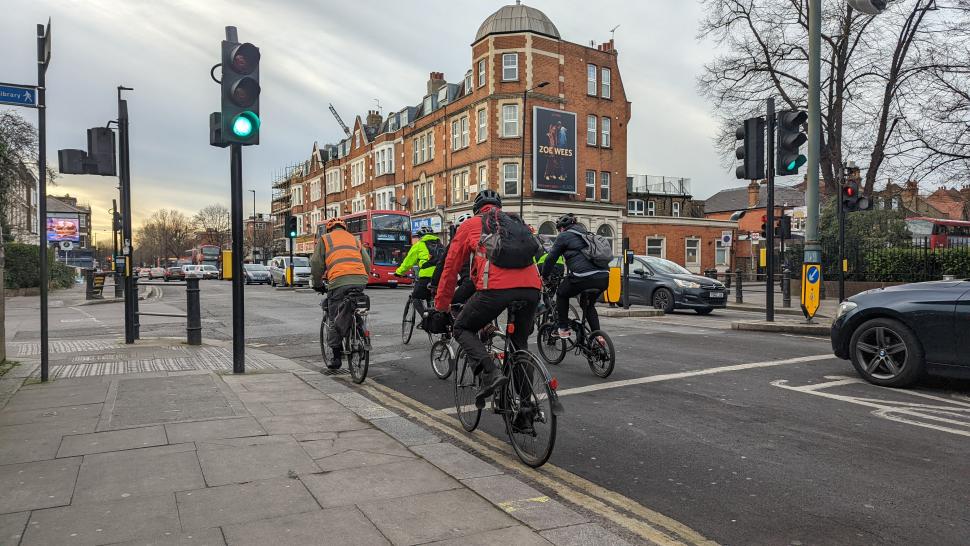You might have seen the Blue Monday-brightening research from the University of Edinburgh that we reported on yesterday, a study further demonstrating the health benefits of cycling, namely that those who commute by bike are less likely to be prescribed antidepressants than people who commute by other means.
In short, the study published in the International Journal of Epidemiology concluded: “This work suggests that cycle commuting is causally related to reduced mental ill-health and provides further evidence in support of the promotion of active travel to encourage commuters travelling shorter distances to shift to cycle commutes”.
Good news for everyone then. Good news for people cycling to work who get the benefit, also good news for the rest of society benefiting health wise and economically from less people requiring mental health prescriptions. That’s what we thought anyway.
> Guide to cycling to work — beat the cost-of-living crisis and feel healthier and happier commuting by bike
However, in a column published in today’s edition of The Times newspaper, written by Robert Crampton, the seemingly indisputably positive research was the inspiration for, not some pro-cycling positivity, but a bizarre anti-cyclist rant about “the speeding, semi-psychotic masses”.
“I’m thinking that if Scottish cyclists are anything like many in London, pedestrians and motorists north of the border are on the happy pills because half-crazed two-wheeled commuters are making them anxious,” Crampton suggests, saying that for 25 years he cycled to work (and boosted his mental health) but the appeal “wore off” with age, “partly egotistical because I started to get overtaken regularly”.
“Partly, also, the nature of a typical cyclist changed as the numbers first grew, then, 15 or so years ago, exploded. Back in the day, I felt — not entirely fancifully — we were a fraternity. Diverse, eccentric, a little peculiar, but chilled. Peaceable. Even-tempered,” he wrote.
“Now, that vibe has been subsumed in a mass of angry, intolerant, semi-psychotic Strava men, aged 30-50 for the most part, monitors strapped to their arm, glazed expression, powering along making no distinction between red or green, pavement or road, one-way or two-way, speed never sacrificed in the quest to shave a second off their personal best.
> Best commuter bikes 2024 — beat the traffic by cycling to work
“I took issue with a light-jumper a while back for almost mowing down an entire crocodile of six-year-olds. ‘But I’m on a bike!’ he whined, unable to compute that, once saddled up, he might still be subject to the Highway Code, not to mention the demands of common decency. Puffing along nervously in the slipstream of crazed narcissists? Or snug on the top deck of the 388? I know which is better for my mental health. Context is all.”
Perhaps we should return to the experts for the final word, the professor who led the study, Chris Dibben, commenting on his research by saying it “suggests that a policy of investing in cycle paths and encouraging active commuting is likely to have wide-ranging benefits”. No mention of launching bizarre rants in national newspapers, unsurprisingly.
For whatever reason however, cycling has been the subject of countless similar pieces over the years, a trip into the road.cc archives suggesting The Times is a less frequent offender than others.
> 20 of the most hysterical Daily Mail anti-cycling headlines
In 2020 however, Cycling UK complained to the Sunday Times over a column by Rod Liddle which said it was “tempting” to stretch piano wire across the road to target cyclists. The column was published on the same weekend a cyclist was hospitalised by riding into such a trap, however press watchdog IPSO deemed it had not breached its Editors’ Code of Practice, the newspaper arguing the column was “not intended to be taken seriously”. Perhaps that advice should be heeded today also…

Sarah Carter is a health and wellness expert residing in the UK. With a background in healthcare, she offers evidence-based advice on fitness, nutrition, and mental well-being, promoting healthier living for readers.










